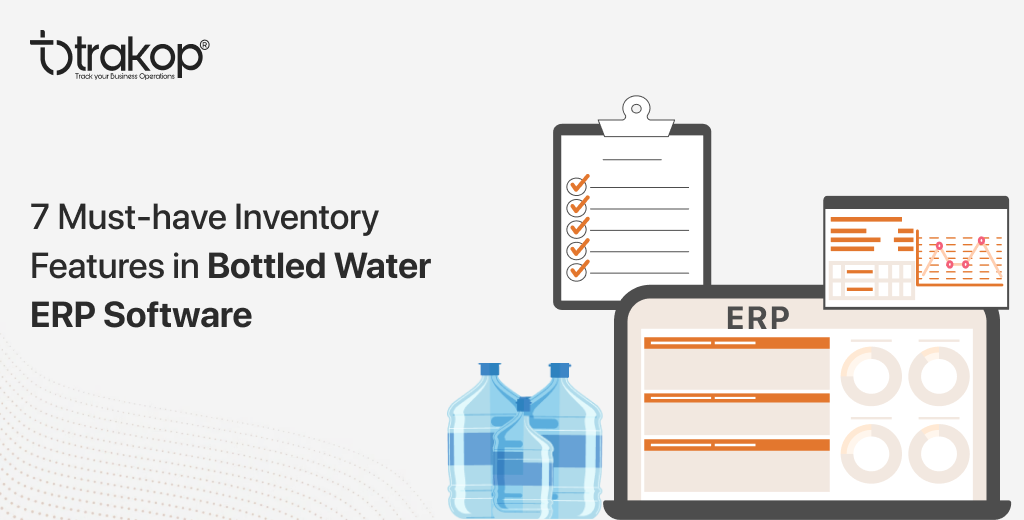7 Must-Have Inventory Features in Bottled Water ERP Software

While you might think water doesn’t decay or spoil, the bottles it is stored in do, which impacts water quality. This makes efficient inventory tracking crucial for bottled water businesses. Moreover, the strict regulatory compliance requirements for the bottled water industry necessitate more effective operational management. This is where bottled water ERP software comes into the picture.
The bottled water ERP software is an enterprise resource planning platform that provides multiple business modules to help you improve end-to-end operations. The modules include Manufacturing, Inventory, Purchase, CRM, Sales, and Field Service. This blog will explore the features of the TrakOp ERP’s Inventory Module that help you with bottled water inventory management.
The top 7 must-have inventory features in bottled water ERP
1. Batch/lot tracking
Batch/lot tracking refers to monitoring water bottles in groups that were manufactured together under similar conditions and using the same raw materials. Each such group is assigned a unique batch or lot number. This number acts as a central identifier for all information related to that specific production run. The key information tracked by batch/lot number:
- Production date and time
- Expiration date/best before date
- Raw material sourcing
- Production line/facility
- Quality control data
- Storage conditions
- Shipping and distribution data
Benefits of batch/lot tracking
Quality control – If a quality issue is detected, the batch number immediately identifies affected bottles. You can trace back to the raw material and production conditions for the problematic batch.
Regulatory compliance – The bottled water industry is highly regulated. Batch/lot tracking provides a necessary audit trail to comply with food safety standards and other regulations concerning product origin, ingredients, and processing.
Efficient product recalls – In the event of a product recall, batch tracking can help you precisely identify and target only the affected batches, minimizing cost and brand damage. This allows rapid identification of distributors, retailers, and consumers who received the affected product.
Waste reduction – The ERP for bottled water businesses can alert businesses to batches approaching expiration dates, enabling timely sales and minimizing waste. You can implement inventory management strategies such as FIFO or FEFO to ensure that old or soon-to-expire stock is sold first.
Brand reputation – The ability to quickly and effectively manage quality issues and recalls builds customer trust. It fosters transparency in product origin and quality through traceability, enhancing brand reputation.
Operational efficiency – The system automates data capture and record-keeping, reducing manual errors and labor. It streamlines end-to-end processes from procurement to distribution.
2. Asset management
Asset management refers to tracking, managing, and optimizing all assets directly and indirectly related to bottled water production and distribution. It is more than managing finished products and raw materials; it includes assets that are crucial for business processes and often circulated or reused. Assets managed in the bottled water business are:
- Empty water bottles
- Water dispensers/coolers
- Crates, pallets, and other packaging material (reusable)
- Production equipment
Benefits of asset management in the bottled water ERP
Reduced costs – Efficient asset management minimizes the loss of reusable water bottles and dispensers, saving unnecessary financial losses. It optimizes maintenance, reducing emergency repairs and extending the asset’s lifespan. The system ensures better resource allocation for asset repairs and replacements.
Improved efficiency – The system streamlines asset tracking and movement, reduces manual effort and errors. It ensures faster turnaround for reusable bottles. The ERP software optimizes delivery routes considering the assets to be picked up.
Enhanced customer service – Efficient asset management ensures clean, functional dispensers. Automation provides accurate billing for rentals and deposits. Scheduled maintenance, a sub-feature of asset management, minimizes delays in dispenser service.
Better resource utilization – Ensures that the right number of reusable bottles and dispensers are in circulation, reducing the need for excessive purchases.
Regulatory compliance – Maintains accurate asset records for efficient tracking and maintenance, which are crucial for regulations and audits.
Informed decision – Provides meaningful insights into asset performance, empowering businesses to make data-driven decisions.
3. Purchase orders
Purchase orders are a legally binding document issued by a buyer to a seller, indicating intent to purchase specific goods or services. In bottled water businesses, they are crucial for managing the procurement of raw materials, packaging, and other supplies for production and distribution. Components of a purchase order are:
- PO number (unique identifier)
- Vendor information
- Ship-to address
- Order date
- Required delivery date
- Payment terms
- Line items – item code/SKU, description, Unit of Measure (UOM), unit price, total line item value
- Subtotal
- Taxes
- Shipping costs
- Total amount
- Authorization
Benefits of purchase orders in bottled water inventory management
Reduced stockouts – Ensures a continuous supply of bottles, caps, labels, and water treatment chemicals.
Optimized inventory levels – Prevents overstocking and understocking, reducing carrying costs and waste.
Improved cash flow – Efficient inventory management means less capital tied up in dormant stock.
Enhanced supplier relationship – Clear communication and timely payments build trust.
Greater transparency and accountability – tracks every aspect of the procurement process.
Faster and more accurate receiving – Streamlines and optimizes warehouse management.
Compliance and audit trail – Provides records and documents for internal and external audits.
4. Warehouse management
This feature is part of TrakOp’s bottled water ERP inventory module, which handles the physical movement, storage, and tracking of bottled water products and associated materials, including empty bottles, caps, and labels. This aims to optimize warehouse operations, minimize costs, and ensure timely order fulfillment. Warehouse management features for efficient inventory management are:
- Real-time inventory tracking
- Multi-warehouse management
- Supports multiple picking strategies
- Barcode scanning/RFID integration
- Route optimization
The benefits of warehouse management for bottled water inventory management are:
Reduced stockouts and overstocking – Ensures optimal inventory levels, meeting customer demands, and minimizing holding costs and spoilage.
Improved efficiency – Automation eliminates manual data entry, streamlines workflows, optimizes processes, accelerates operations, and reduces labour costs.
Enhanced accuracy – Minimizes human errors for accurate inventory tracking, picking, and shipping.
Better customer satisfaction – Timely and accurate order fulfillment leads to a happier customer base.
Regulatory compliance – Fosters batch or lot tracking for easy recalls and adherence to food safety regulations.
Cost savings – Reduces waste, minimizes spoilage, optimizes storage space, and lowers manual efforts.
Real-time decision making – Provides up-to-date data for making informed decisions on procurement, production, and distribution.
5. Return management
This inventory feature refers to the processes and functionalities that handle the return of products from your customers or distributors. Return management is crucial for bottled water businesses to manage empty water bottles and damaged products. Types of returns in the bottled water business:
- Empty bottle returns (tracking empty bottles, inventories of empties, exchange processes, & deposit management)
- Damages/defective product returns
- Expired product returns
- Order cancellation returns
- Overstock returns from distributors/retailers
The benefits of return management in the bottled water business are
Improved customer satisfaction – Efficient and transparent return processes improve customer experience and satisfaction rates.
Reduced losses – Minimize waste from damaged or expired products and ensure proper handling of reusable empty water bottles.
Better inventory accuracy – Real-time inventory updates on returned items ensure accurate inventory counts, preventing stockouts or overstocking.
Enhanced efficiency – Automating returns reduces manual efforts and processing times.
Cost control – Identify and manage costs associated with returns and lost empty bottles.
Sustainability – Proactively managing the return and reuse/recycling of bottles contributes to environmental efforts.
Compliance – Ensures adherence to regulations regarding product quality, disposal, and customer rights.
6. Advanced BI tools
TrakOp’s ERP for bottled water businesses leverages data analytics, machine learning, and reporting to provide meaningful insights and empower data-driven decisions. The system centralises data and provides real-time inventory levels, historical sales data, production schedules, supplier information, delivery logs, and customer feedback. The system captures data from multiple sources to provide a comprehensive view of operations.
The ERP Business Intelligence tool analyzes historical sales data, seasonal trends, promotions, market events, and external factors to anticipate future demands. Knowing your inventory requirements can help prevent stockouts and overstocking. The system enables businesses to simulate various scenarios and analyse their potential impact on inventory, thereby facilitating risk management.
The system provides real-time inventory visibility and automated alerts for low stock, batches approaching expiration dates, discrepancies in inventory counts, and unexpected changes in demand.
Benefits of advanced Business Intelligence (BI) tools for inventory tracking
- Reduced costs – Minimizes holding costs, spoilage or waste, and stockout costs.
- Improved efficiency – Automates manual inventory tasks, streamlining workflows and optimizing resource allocation.
- Enhanced customer satisfaction – Ensures product availability, leading to fewer stockouts and faster order fulfillment.
- Better decision-making – Provides actionable insights for strategic planning and proactive problem-solving.
- Increased profitability – Optimizes inventory levels, reduces costs, and improves customer satisfaction, contributing to higher profits.
- Regulatory compliance – Enables batch tracking and traceability, which is critical for meeting industrial regulations and responding quickly to recalls.
7. Barcode scanning
Barcode scanning in an ERP inventory module streamlines and automates various processes, increasing accuracy, efficiency, and real-time visibility. Each product is assigned a unique barcode that acts as its fingerprint. The barcode encodes critical product information, including product ID (SKU), batch number, manufacturing date, expiration date, and location within the warehouse. Types of barcodes are:
- 1D barcodes (UPC or EAN) – Commonly used for individual product items. They are encoded horizontally.
- 2D barcodes (QR codes or data matrix) – Can store more information, both horizontally and vertically. They are often used for tracking pallets or more complex logistics.
Barcodes are scanned using scanning devices that are integrated into the system during order picking, inventory transfers, bottling, physical stock counting, return management, and receiving goods.
Benefits of ERP inventory barcode scanning for companies that sell bottled water
Accuracy – Automating eliminates human errors from manual data entry.
Efficiency and speed – It significantly reduces time consumption for inventory management tasks.
Real-time visibility – Provides up-to-date information on stock levels and locations. This is crucial for managing water shelf-life and preventing stockouts and overstocking.
Traceability – It is critical for bottled water businesses. The system allows precise tracking of every bottle or batch from production to order fulfillment. It is essential in case of quality issues or recalls.
Reduced labor costs – Reduces time spent on manual inventory management.
Optimized warehouse processes – Enables better warehouse organization and workflow.
Compliance – Contributes to meeting regulatory requirements and traceability of bottled water.
Conclusion
TrakOp offers an ERP for bottled water businesses aiming to simplify inventory management and reduce costs. It automates and streamlines stock counting and leveling, ensuring sufficient inventory to fulfill your customer demands. If you are interested in implementing an ERP system for bottled water inventory, schedule a call to discuss your requirements.
Hope You Enjoyed the Read!

He loves to explore. His passion for helping delivery industries in all aspects flows through in the vision he has. In addition to providing smart solution to make delivery process flawless, Ravi also likes to write sometimes to make it easier for people from business industry looking for digital solutions.




